About
Department of Computer Science and Engineering was established in 2001 with an intake of 60 students, which eventually increased to 120 in 2011. The department’s faculty members and technical assistants are rich in academic, industrial and research experience. With technology becoming insidious in everyday life, opportunities for computer engineers are plenty. The department laboratories are configured with latest technologies imparting utilities or practical knowledge. Apart from academics and projects the department also encourages its student to take part in extracurricular activities for an all-round development and boosting confidence levels. Hence we encourage events like CSE United, Alumni meets and Farewell each academic year.
Mission
To impart quality education by applying ingenious and modern methods of pedagogy thereby calibrating one’s individual outlook towards problem solving.
To recognize the flair and talent of individuals who will be nurtured tobecome leadersand innovators in industry and education and bring them to the limelight by enhancingtheir entrepreneurship skil.
To promote higher studies and research activities by indulging in innovative projects and collaborative ventures with the industry and premier institutes.
To create graduates to be successful, ethical and lifelong learners by imbibing holisticeducation to promote sustainability and contribute to the social well-being.
To boost employability skills through intra, inter-departmental and inter-institutionalactivities beyond curriculum thereby invigorating team-building activities andleadership skills to instil confidence and creativity.
Vision
To be a leaderin Computer Science and Engineering education by providing a platform to produce industry and/or research oriented individuals contributing to the enrichment of the society.
Program Outcomes
1. Engineering knowledge: Apply the knowledge of mathematics, science, engineering fundamentals, and engineering specialization to the solution of complex engineering problems.
2. Problem analysis: Identify, formulate, research literature, and analyze complex engineering problems reaching substantiated conclusions using first principles of mathematics, natural sciences, and engineering sciences.
3. Design/development of solutions: Design solutions for complex engineering problems and design system components or processes that meet the specified needs with appropriate consideration for the public health and safety, and the cultural, societal, and environmental considerations.
4. Conduct investigations of complex problems: Use research-based knowledge and research methods including design of experiments, analysis and interpretation of data, and synthesis of the information to provide valid conclusions.
5. Modern tool usage: Create, select, and apply appropriate techniques, resources, and modern engineeringtools including prediction and modelling to complex engineering activities with an understanding of the limitations.
6. The engineer and society: Apply reasoning informed by the contextual knowledge to assess societal, health, safety, legal and cultural issues and the consequent responsibilities relevant to the professional engineering practice.
7. Environment and sustainability: Understand the impact of the professional engineering solutions in societal and environmental contexts, and demonstrate the knowledge of, and need for sustainable development.
8. Ethics: Apply ethical principles and commit to professional ethics and responsibilities and norms of the engineering practice.
9. Individual and team work: Function effectively as an individual, and as a member or leader in diverse teams, and in multidisciplinary settings.
10. Communication: Communicate effectively on complex engineering activities with the engineering community and with society at large, such as, being able to comprehend and write effective reports and design documentation, make effective presentations, and give and receive clear instructions.
11. Project management and finance: Demonstrate knowledge and understanding of the engineeringand management principles and apply these to one’s own work, as a member and leader in a team, to manage projects and in multidisciplinary environments.
12. Life-long learning: Recognize the need for, and have the preparation and ability to engage in independent and life-long learning in the broadest context of technological change.
Program Educational Objectives
1. To excel as successful career professionals in various fields of Computer Science and Engineering and to pursue research.
2. To establish expertise in solving contemporary problems in analysis, design and evaluation of computer and software systems.
3. To engage in lifelong learning and professional development to adapt to rapidly changing work environment.
4. To demonstrate entrepreneurial skills, lead teams built across multidisciplinary and cross cultural backgrounds and to make fruitful contributions towards overall societal development.
Program Specific Outcomes
1. Ability to understand the working principles of computer systems.
2. Ability to apply mathematical formulations and algorithms to solve real world problems with professional skills.
3. Ability to identify research gaps and propose suitable innovative solutions.
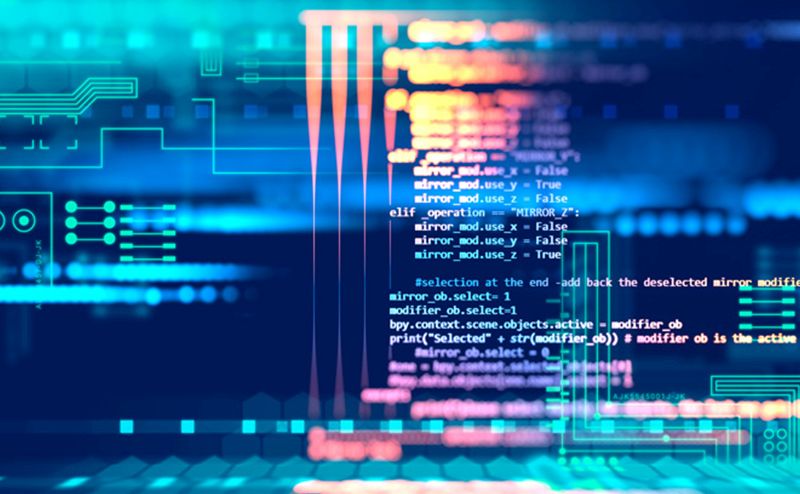
Computer Science & Engineering
B.Tech : Techno Main Salt Lake provides B.Tech program in the department of Computer Science & Engineering. Students enrolled in this course will be able to understand the concept of computing, develop a strong foundation of the basic mathematics of computing and understand the engineering considerations involved in the design, implementation and usage of computing systems.
B.Tech Lateral : Techno Main Salt Lake provides B.Tech lateral entry program in the department of Computer Science & Engineering. This course enables aspirants with 3 years diploma in engineering or an equivalent degree to get admitted in 2nd year of B.Tech Computer Science & Engineering.
M.Tech : Techno Main Salt Lake provides M.Tech program in the department of Computer Science & Engineering. A master’s degree in Engineering involves research studies in varied fields of specializations. Participation in International conferences and submission of research papers in premier journals are paid utmost importance at Techno Main.
Laboratories
b. A brief description of Major instruments/Softwares
i. Desktop Computer (Pentium CPU 3.10 GHz, 4 GB RAM, 500 GB HDD) – 40 Nos.
ii. Network Switch (24 ports, Gigabit) – 2 Nos.
iii. GNU Prolog / Turbo Prolog
iv. Xilinx ISE Design Suite 14.7
v. CodeBlocks with GNU C Compile
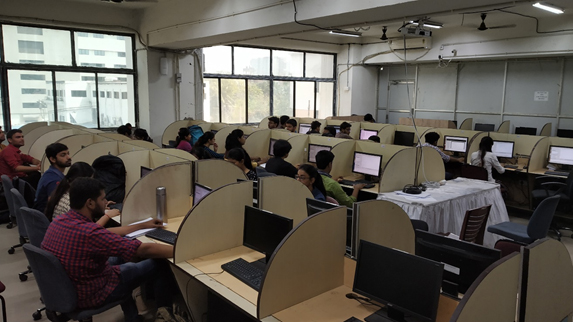
b. A brief description of Major instruments/Softwares
i. Desktop Computer (Pentium CPU 3.10 GHz, 4 GB RAM, 500 GB HDD) – 20 Nos.
ii. Network Switch (24 ports, Gigabit) – 1 Nos.
iii. ALTERA DE2-115 FPGA Board
iv. ALTERA DE4 Board
v. ALTERA D8M-GPIO Board
vi. ALTERA MT LCD Module
vii. SERVO-MOTOR KIT
viii. Lenovo ThinkServer RS160 (Xeon Quad Core CPU, 8 GB RAM, 2 TB RAID HDD) – 1 No.
ix. LCD Projector (Epson EBS31)
x. ALTERA Quataus II Design Suite
b. A brief description of Major instruments/Softwares
i. Desktop Computer (Pentium CPU 3.10 GHz, 4 GB RAM, 500 GB HDD) – 46 Nos.
ii. Network Switch (24 ports, Gigabit) – 2 Nos.
iii. LINUX (Ubuntu 14.04)
iv. CodeBlocks with GNU C Compiler
v. Wireshark
vi. Windows 8.1
vii. Visual Basic 6.0
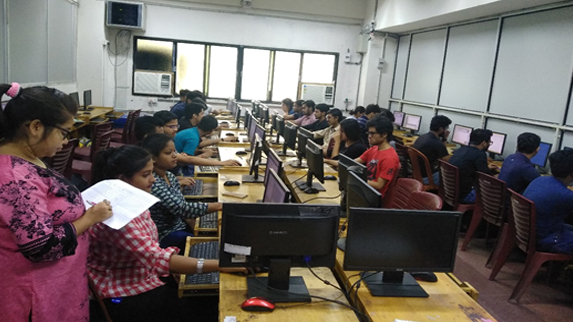
b. A brief description of Major instruments/Softwares
i. Desktop Computer (Pentium CPU 3.10 GHz, 4 GB RAM, 500 GB HDD) – 46 Nos
ii. Network Switch (24 ports, Gigabit) – 2 Nos.
iii. CodeBlocks with GNU C Compiler
iv. JDK 1.8
v. Eclipse Mars
vi. Netbeans
vii. Oracle 10g client
viii. Dia
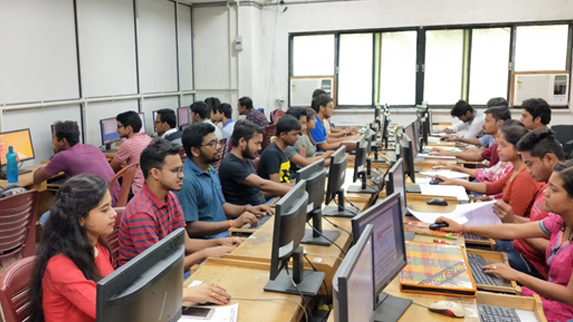
b. A brief description of Major instruments/Softwares
i. Desktop Computer (Pentium CPU 3.10 GHz, 4 GB RAM, 500 GB HDD) – 40 Nos.
ii. Network Switch (24 ports, Gigabit) – 2 Nos.
iii. CodeBlocks with GNU C Compiler
iv. JDK 1.8
v. Eclipse Mars
vi. Netbeans
vii. Oracle 10g client
viii. Dia
ix. MS Project
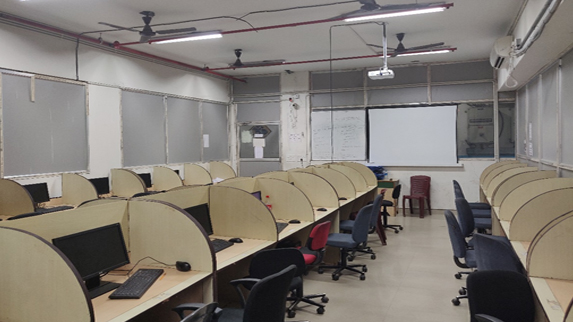
b. A brief description of Major instruments/Softwares
i. Power Supply cum Logic Probe - 20 Nos.
ii. Bread Board -20 Nos.
iii. Integrated Chip - 20nos. Each Chip (74ls85,74ls32,74ls04,74ls08,74ls83,74ls181,74ls86,74ls11,74ls157.74ls10)
In the Virtusa Java Enterprise CoE, training is provided to the students on core and advanced Java (including frameworks like Spring MVC and Spring Boot) and Angular JS. It aims to hone, engage and incubate talent to bridge the Academia-Industry requirements. This provides the students with an opportunity to be trained on additional technologies to be industry ready while still being at the campus with the benefit of industry certifications paving their way to success.
b. A brief description of Major instruments/Softwares
i. Processor: INTEL Core i5 - 55 Nos.
ii. RAM : 8 GB
iii. Hard Disk: 512 GB
iv. OS: Windows 10
v. Pegasystem Anywhere, SB Browser, VM Ware, Eclipse
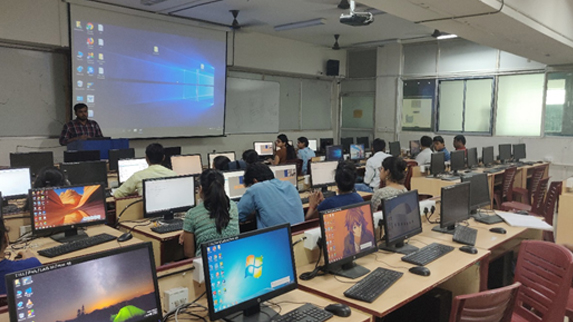
b. A brief description of Major instruments/Softwares
i. Desktop Computer (Pentium CPU 3.10 GHz, 4 GB RAM, 500 GB HDD) – 60 Nos.
ii. Network Switch (24 ports, Gigabit) – 3 Nos.
iii. Windows
iv. Linux
v. CodeBlocks with GNU C/C++ Compiler
vi. JDK 1.8
vii. Eclipse Mars
viii. Netbeans
ix. Oracle 10g client
x. Dia
xi. MS Project
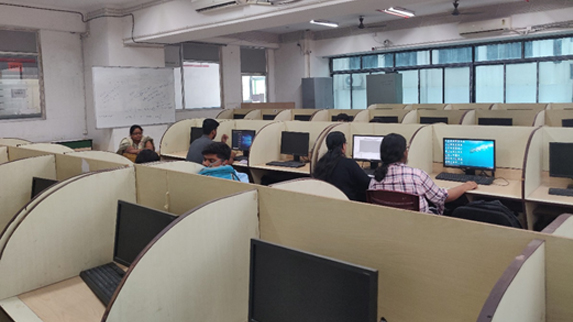
Research
Contact
Department of Computer Science and Engineering
Phase-III Building, EM4/1, Sector-V, Salt Lake,Kolkata-700091.
E-mail: hod.cse14@gmail.com / hodcse@ticollege.ac.in
H.O.D: Extn. No. 240, FACULTY MEMBERS: Extn. No. 216
